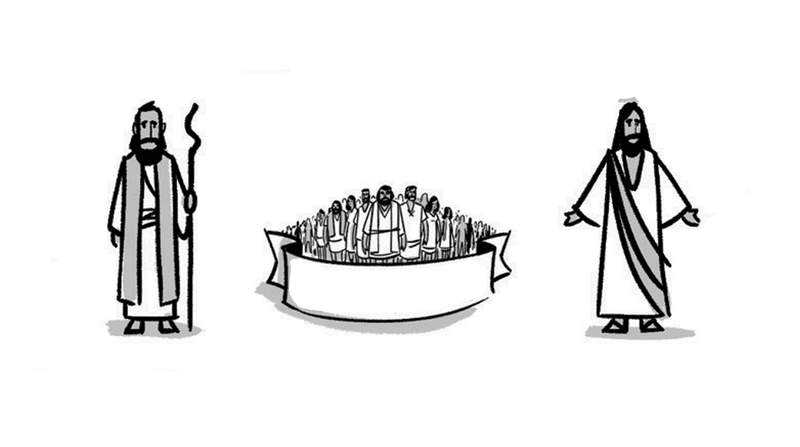The Book of Hebrews
About

The author of this letter is unknown, but people have long speculated about whether or not Paul or one of his coworkers, like Barnabas or Apollos, wrote it. There is an interesting bit of information about the author in 2:3-4, where he says he had a firsthand relationship with the disciples who were around Jesus. So even if we don’t know who wrote this letter, we do know that it is anchored in the teaching of the apostles.
It’s also unclear who the audience of this letter was or where they lived. The author, however, knows them well, and he also assumes they have a thorough knowledge of the Hebrew Scriptures, especially the Torah. The author expects them to be familiar with the story of Abraham’s family, all the details of the exodus, what happened at Mount Sinai, and Israel’s journey through the wilderness. Because of this expectation, it’s most likely that this letter was written to Jewish Christians, which explains the letter’s title, “to the Hebrews.”
We have clues from 10:32-34 that this community was facing persecution and imprisonment because of their association with Jesus and that some in the community were abandoning the faith. All of this explains the purpose and structure of the letter. There is a short introduction (Heb. 1:1-4), followed by four sections in which the author compares and contrasts Jesus with key people and events from Israel’s history: angels and the Torah (Heb. 1-2), Moses and the promised land (Heb. 3-4), the priests and Melchizedek (Heb. 5-7), and the sacrifices and the covenant (Heb. 8-10). After all these comparisons, he challenges these Christians to follow Jesus no matter the cost (Heb. 11-13).
Throughout all the comparisons that make up the main body of the letter, the author has two main goals. First, he elevates Jesus as superior to anyone and anything else in order to show that he is worthy of total trust and devotion. Second, he challenges these believers to remain faithful to Jesus despite persecution. This is why each section includes a strong warning to not abandon Jesus.
Hebrews 1-2: Jesus Compared to Angels and the Torah
The elevation of Jesus begins right away in the opening sentence of the introduction. “In the past, God spoke to our ancestors in many different ways, but in these last days he has spoken to us in his Son” (Heb. 1:1). The author is saying that Jesus is superior to all the previous ways God had revealed himself to Israel. He goes on to make an astounding claim that Jesus is “the radiance of God’s glory and the exact imprint of God’s nature.” These metaphors of radiance and imprinting are making the closest possible identification between Jesus and the God of Israel. Jesus is what the rays of light are to the sun or what the wax impression is to a signet ring. For this author, there is no God apart from Jesus. He is the one true Creator God become human as the Son. This elevated view of Jesus is continually explored throughout the whole letter.
Chapters 1-2 compare Jesus to angels, which might strike us as a bit odd. But in Jewish tradition, it was taught that the Torah and the words of God were delivered to Moses at Mount Sinai by angels (Deut. 33:2). So by saying that Jesus is superior to angels, the author is claiming that Jesus and his message of good news are superior to all previous messengers of God’s word.
The first warning flows out from this key point. If Israel was called to pay attention to the Torah delivered by angels, how much more should we pay attention to the message announced by the Son of God? Not only that, but given Jesus’ status above the angels, how remarkable is it that he gave it up to become human and to suffer and die? In Jesus, we see God’s great glory and humility, as he sympathetically joined himself to humanity’s tragic fate.

Hebrews 3-4: Jesus Compared to Moses and the Promised Land
Chapters 3-4 move on to argue that Jesus is superior to Moses, who led Israel through the wilderness and built the tabernacle. Jesus is also a leader of God’s people, but in him, we see the builder of not just a tent but all creation. The author retells the story of how the Israelites rebelled against Moses in the wilderness, losing their chance to enter into the rest offered in the promised land. It’s from this point that the second warning comes. If Jesus is greater than Moses, how much higher are the stakes if we rebel against him? We are also in a similar wilderness environment, trusting in God for the future rest of the new creation. Let’s make sure that we don’t act like Israel did in the wilderness, losing out on God’s gracious offer to enter that new world.
Hebrews 5-7: Jesus Compared to the Priests and Melchizedek
Chapters 5-7 compare Jesus to Israel’s priests from the line of Aaron. The role of these priests was to represent Israel before God and offer sacrifices that atoned for the sins of the people. However, those same priests were morally flawed, so they constantly had to offer sacrifices for their own sins as well as for others. Something more was needed—an ultimate priest. The author says Jesus is that priest, but he didn’t come from the line of Aaron.
Jesus was a priest in the order of Melchizedek, the mysterious priest-king in ancient Jerusalem who briefly appears in the story of Abraham (Gen. 14). In Psalm 110, we’re told that the messianic King from the line of David would be a priest from the order of Melchizedek. The point is that Jesus is the ultimate priest-king. He is morally flawless and eternally available for his people, and he is superior to any other mediator between God and humans. With this in mind, the author warns the people that to reject Jesus is to reject one’s only chance to be reconciled to God.
Hebrews 8-10: Jesus Compared to Sacrifices and the Covenant
This brings us to the last comparison in chapters 8-10. The author shows how Jesus’ death on the cross was the ultimate sacrifice, vastly superior to any animal sacrifices offered in the temple. Those sacrifices had to be offered every day and every year on the Day of Atonement. In contrast, when Jesus offered his life once and for all, it was sufficient to cover the sins of the entire world. The author warns that walking away from Jesus means turning your back on God’s gracious offer of forgiveness. Jesus’ sacrifice is permanent and acts as the foundation for the new covenant spoken of in the Prophets, in which all sins are forgiven.

Hebrews 11-13: An Encouragement to Stay Faithful to Jesus
Now that the author has elevated Jesus through all these comparisons, the final section is one big challenge to continue following him. Given all that has been said about Jesus, that he is God’s very word (Heb. 1-2) and offers hope for new creation (Heb. 3-4), that he is an eternal priest (Heb. 5-7) and the perfect sacrifice (Heb. 8-10), it only makes sense that we should follow all the great models of faith found within the story of the Scriptures (Heb. 11) by remaining faithful to Jesus. The author urges these suffering Christians to trust that, despite hardship and persecution, God will not abandon his people (Heb. 12-13).
Here are a few extra tips when reading this letter. When the author quotes from the Old Testament, which is nearly every other sentence, we should stop to look up the reference and read the quotation in its original context. Sometimes we may be puzzled, but more often than not, we will see extra connections that may have gone unnoticed. This extra step is well worth the effort.
And remember, these warning passages are supposed to make us a little uncomfortable. They’re not meant to scare us—they’re meant to show us that rejecting Jesus is foolish. The warnings serve the larger purpose of showing that Jesus is the ultimate revelation of God.

